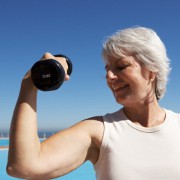Whether you consider yourself healthy, unhealthy, or somewhere in between, you are never invincible to anything, mostly in part because we are made of bone, not steel. And since that is the case, the health of your bones is crucial to your everyday lifestyle and well-being. As you can imagine, without bones you would not be able to stand, walk, play catch with your son or daughter, eat or move in any capacity. So, ask yourself this – what do you do to keep your bones in tip top shape? For a large percentage of America - besides drinking their daily dose of milk - nothing. Many not only take their health for granted at a young age, but their bone health especially. Therefore, when you are diagnosed with osteopenia at a fairly young age, your jaw may drop to the floor and not understand what happened.
The best way to define osteopenia is when your bone density is lower than normal. To be clear, this is considered a “precursor” to osteoporosis, but not everyone who has osteopenia develops osteoporosis. If you were to chart a normal healthy bone and a bone with osteoporosis, the density of osteopenia would be in the middle.
During the natural course of human life, bone loses its density over time. This is both natural and normal. However, if you don’t make the effort to build strong healthy bones in the earlier years of your life, you are more susceptible to osteopenia in the latter part of your life. In general, it is noted that your peak bone density is around 30 years old. Then it’s all downhill from there - but then again, what isn’t downhill after 30?
It is important to note that with osteopenia there is not necessarily bone loss, like with osteoporosis, but rather bone density loss. Think of your bone like a wet sponge. When the water starts to dry the sponge doesn’t get small, rather lighter, making your bones more brittle.
While I said earlier that anyone is at risk for ostepenia, there are situations that put you at a higher risk. For one, women tend to face this condition more than men due to hormonal changes that occur with menopause. But on the other hand, women are usually more knowledgeable on their odds and therefore take more preventative measures. Also, if you have any pre-existing conditions related to eating disorders that prevent you from receiving the necessary nutrients your bones need, chemotherapy, steroid use to treat a certain condition, or exposure to radiation your odds of developing osteopenia rise significantly more.
If you find yourself in any one of these categories, you may be a risk for developing osteopenia. It is important to be informed of this lesser-known condition and get the proper treatment to potentially avoid it developing into osteoporosis. For more information regarding treatment and prevention, look for my latest article on osteopenia.






Add a Comment1 Comments
Nicely said.
May 24, 2010 - 10:06amI have osteopenia as a byproduct of rheumatoid arthritis. When we are young and able to build bone and increase our bone density, we do not realize how important it is. I'm lucky my mother was a bit of a health nut, so I had healthy bones before I got sick. I have more to lose before I end up osteoporotic.
Thank you for writing this article!
This Comment